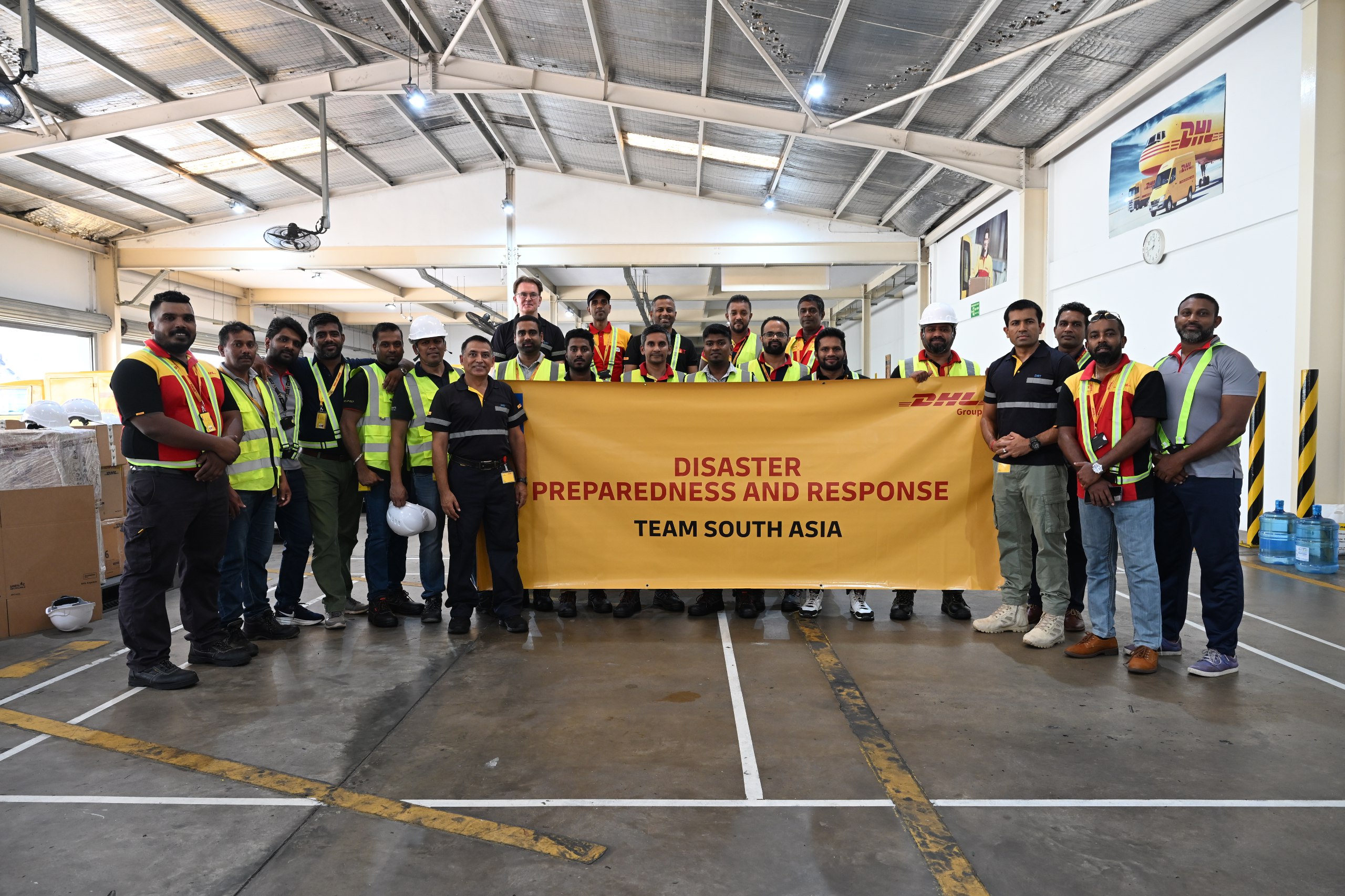- DHL’s GoHelp program equips local employees with critical disaster response skills to enhance resilience 20 years after the 2004 Indian Ocean tsunami devastated Sri Lanka
DHL
Group’s
first
GoHelp
Disaster
Response
Team
(DRT)
training
in
Sri
Lanka
The
first
DRT
training
in
Sri
Lanka
was
held
from
November
23-24
at
the
DHL
Express
Service
Center
in
Colombo.
Twenty
employees
from
both
DHL
Express
and
DHL
Global
Forwarding
attended
the
training.
Employees
were
equipped
with
specialized
skills
to
manage
relief
cargo
efficiently
and
ensure
that
aid
reaches
those
in
need
safely
during
times
of
crisis.
Participants first attended a workshop on safety and stakeholder management, including how to work with NGOs, military, government organizations, and the media, before going through practical skills training, including a disaster simulation, where they were coached on relief cargo management during a crisis and forklift driving.
Since 2005, DHL Group has volunteered its logistics expertise and global network in partnership with the United Nations to help provide global relief efforts in disaster areas via their GoHelp program. In times of disaster, the DRTs are deployed to landside or airside facilities in need of assistance when called upon by the United Nations Office for the Coordination of Humanitarian Affairs, to better manage incoming relief goods.
“As we mark 20 years since the 2004 Indian Ocean tsunami profoundly impacted Sri Lanka, the humanitarian landscape has evolved significantly. Today, the focus is shifting from reactive disaster response to proactive preparedness. In line with this trend, we have adapted our Disaster Response Team (DRT) training beyond airport logistics to include warehouse management during crises. This ensures our employees are equipped to manage relief cargo effectively and provide critical aid across multiple touchpoints during emergencies,” noted Carl Schelfaut, Head of the GoHelp program, Asia Pacific, DHL Group.
The Indian Ocean earthquake and tsunami, the deadliest tsunami in recorded history, devastated communities along the surrounding coasts of the Indian Ocean in December 2004, killing an estimated 228,000 people in 14 countries, including Sri Lanka.
“Sri Lanka’s geographical position makes it particularly vulnerable to natural disasters such as tropical cyclones and storm surges. The devastation caused by the 2004 tsunami remains a stark reminder of the importance of being well-prepared for emergencies,” noted Dimithri Perera, Country Manager, DHL Express Sri Lanka. “Twenty years on, it remains essential for businesses to actively contribute to disaster preparedness, and at DHL Express, we are committed to equipping our teams to play a pivotal role in humanitarian efforts.”
Global warming has also led to intensifying monsoon variability, leading to more frequent and severe weather events such as heavy rainfall, droughts, and rising sea levels, which exacerbate flooding and coastal erosion. In October 2024, Sri Lanka experienced severe flooding due to heavy monsoon rains that resulted in landslide warnings issued across multiple districts, including Colombo.
These recent events highlighted the Sri Lanka’s vulnerability to climate-related disasters, emphasizing the need for robust disaster preparedness measures.
“Disaster preparedness is a shared responsibility. We believe in using our logistics expertise to make a tangible difference in crisis situations. Programs like GoHelp train our teams to act swiftly and effectively, empowering them to bring aid where it’s needed most. I am heartened by all our employees who volunteered to be DRT trained, and I hope that our employees can make a meaningful difference during times of crisis, both here in Sri Lanka and around the world,” said Sudeep Raina, Managing Director, DHL Global Forwarding Sri Lanka.
“As the impacts of climate change intensify, the need for swift, efficient, and effective disaster response has never been greater, and well-trained individuals are the backbone of any successful humanitarian effort. The recent DRT training in Colombo is a testament to our commitment to continue equipping our employees with the knowledge, tools, and confidence needed to make a tangible difference when disasters strike. By continuously evolving our training programs to include broader aspects of crisis management, such as warehouse operations and media coordination, we hope to build more resilient communities and contribute to a stronger, faster global humanitarian response,” said Schelfaut.
Hashtag: #DHL
The issuer is solely responsible for the content of this announcement.
Support InfoStride News' Credible Journalism: Only credible journalism can guarantee a fair, accountable and transparent society, including democracy and government. It involves a lot of efforts and money. We need your support. Click here to Donate
